Stand To Your Glasses Steady
Ring out the Old and ring in the New with the classic Air Corps Toast!

Ring out the Old and ring in the New with the classic Air Corps Toast!

WE’VE come to the final story 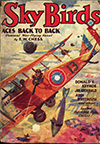 of our twelve tales from the Christmas 1931 issues, and what better way to go out, than with a story from the ever-reliable Arch Whitehouse! Always a crowd-pleaser, Whitehouse wrote hundreds of tales for the air pulps with many featuring series characters. Possibly his longest running series was Buzz Benson! Buzz was featured in every issue of Sky Birds starting with the February 1930 issue. When Sky Birds closed up shop, Buzz moved over to Flying Aces where he continued for two more years.
of our twelve tales from the Christmas 1931 issues, and what better way to go out, than with a story from the ever-reliable Arch Whitehouse! Always a crowd-pleaser, Whitehouse wrote hundreds of tales for the air pulps with many featuring series characters. Possibly his longest running series was Buzz Benson! Buzz was featured in every issue of Sky Birds starting with the February 1930 issue. When Sky Birds closed up shop, Buzz moved over to Flying Aces where he continued for two more years.
Billy “Buzz†Benson is a flying reporter for the Los Angeles Mercury newspaper, but his real job is much more dangerous—he is a secret agent and pilot extraordinaire for the U.S. military. In this month’s issue, deadly forces have stolen the latest high-powered submarine, the Baracuda, as well as kidnapped the designer’s daughter. It’s up to Buzz to get them both back!
The Navy had named their newest submarine the Barracuda, after the deadliest fish that infests tropical waters—that sharp-toothed killer that will attack anything for the joy of battle. Then that sub turned against its masters—and Billy “Buzz†Benson took off on the blood-strewn trail of the killer ship!
OUR penultimate of our  twelve tales from Christmas 1931 issues is another by E.W. Chess—he was a busy man that month with both this as well as a story in Aces! This time we get the bizarre tale of gambling and a four-sided love triangle!
twelve tales from Christmas 1931 issues is another by E.W. Chess—he was a busy man that month with both this as well as a story in Aces! This time we get the bizarre tale of gambling and a four-sided love triangle!
A gambler, was Major Arthur Lem, C.O. of the 25th Yank Pursuit Squadron. All his life he’d gambled—and won, for he bet only when the odds were in his favor. But now, in those flaming skies over the Western Front, the game was different. Young Philip Mayson and those seven hotheaded replacements were gamblers of another breed—and to bet with them. Major Lem had to learn a new way to play his cards! The most unusual air story of the year!
From the pages of Sky Birds, it’s “Aces Back to Back” by E.W. Chess!
If you haven’t check it out, Pulpflakes posted an excellent post about the life of “Elliot Chess—Fighter pilot, Author” last year.

AH, CHRISTMAS! As our present  to our faithful readers on this fine Christmas morning, we give you a curious tale from the Teufelhund Jagdstaffel. It’s those flying leathernecks, Donald E. Keyhoe’s The Devildog Squadron! At the same time Keyhoe was writing the Philip Strange stories for Flying Aces, and the Jailbird Flight stories for Battle Aces, and the Vanished Legion stories for Dare-Devil Aces, we was also telling tales of those flying marines known as the Devildog Squadron for the pages of Sky Birds magazine. A marine flyer himself, Keyhoe imbues the tales of “Cyclone†Bill Garrity and The Devildog Squadron with a realism in their unrealistic events you just don’t find everywhere.
to our faithful readers on this fine Christmas morning, we give you a curious tale from the Teufelhund Jagdstaffel. It’s those flying leathernecks, Donald E. Keyhoe’s The Devildog Squadron! At the same time Keyhoe was writing the Philip Strange stories for Flying Aces, and the Jailbird Flight stories for Battle Aces, and the Vanished Legion stories for Dare-Devil Aces, we was also telling tales of those flying marines known as the Devildog Squadron for the pages of Sky Birds magazine. A marine flyer himself, Keyhoe imbues the tales of “Cyclone†Bill Garrity and The Devildog Squadron with a realism in their unrealistic events you just don’t find everywhere.
The Germans have developed an unstoppable behemoth that shoots a clod light ray that freezes whatever it passes over on contact! While out scouting for the big ship, Luck Lane is forced down and finds himself right in the thick of things! But he finds help in the most unlikely of places! From the December 1931 Sky Birds, it’s Donald E. Keyhoe’s “The Frozen Fate!”
Upon that desolate drome, where stark black trees reared up grimly from the stripped ruin of the tarmac, those Devildogs landed their ships. Biting cold rose up from the ground on that sweltering August day—and near the deadline lay three figures—frozen to death! A thrilling Devildog mystery.
And look for the first volume of the complete tales of the “Cyclone” Bill Garrity and the Devildog Squadron coming soon!
THE Stockings are hanging from 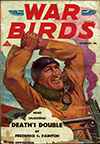 the mantle with care, in hopes that St. Nicholas soon will be there. But we still have time for one more story before the big day—and this time it’s an actual Christmas themed story by Edgar L. Cooper.
the mantle with care, in hopes that St. Nicholas soon will be there. But we still have time for one more story before the big day—and this time it’s an actual Christmas themed story by Edgar L. Cooper.
All Lt. Duke Rittenhouse wanted for Christmas was that last victory that would make him an Ace. And he was determined to get it even if he had to go out in a raging snow storm on Christmas Eve to do so, but it was the gift Baron Rupprecht von Hentzau—the ‘Werewolf of Austria,’ gave him that night, that he’d remember forever.
So pull up a chair and light a fire, get a good drink and enjoy Edgar L. Cooper’s “The Noël Patrol” from the December 1931 War Birds!
Christmas Eve—and the dogs of war were leashed. But Ace-Up remembered his vow of a fifth by Christmas, and the fangs of the Austrian Werewolf were still unpulled.
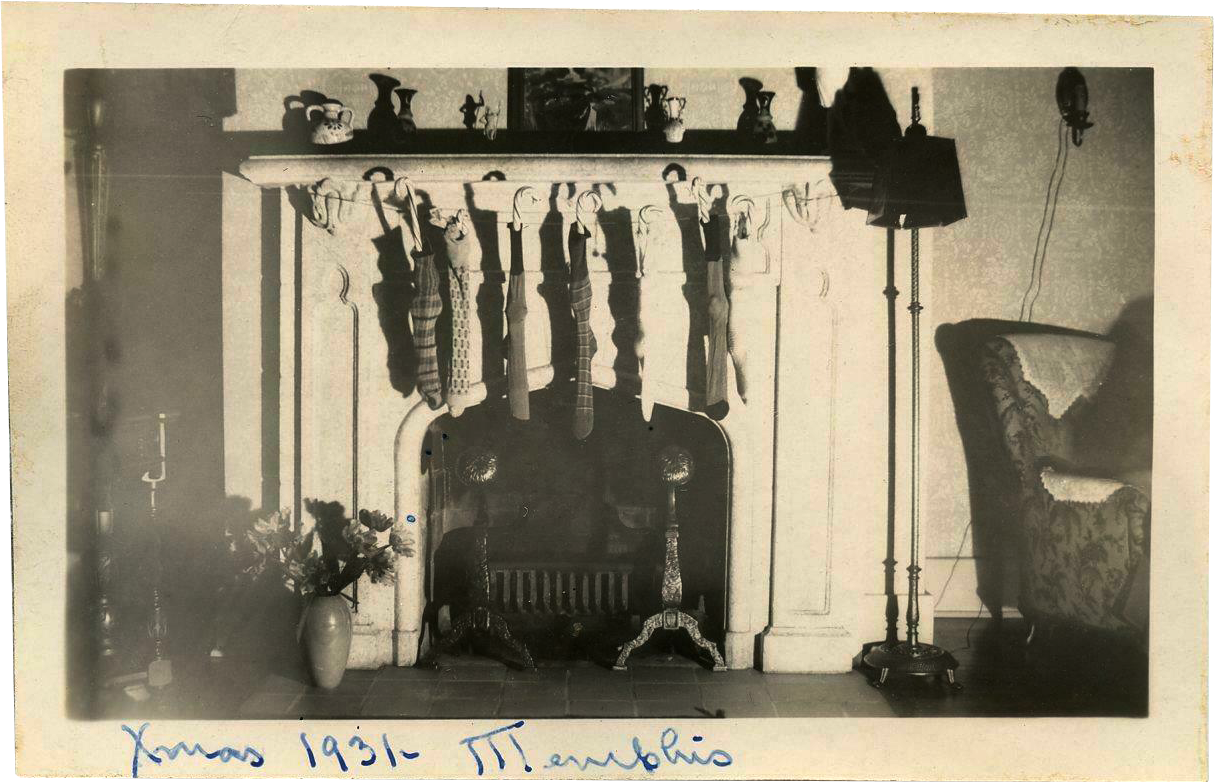
IT’S Christmas week!  And what better way to start it off than with a bit of a ghost story. Our eighth tale of Christmas is O.B. Myer’s “Specter Strafe!” Myers was a pilot himself, flying with the 147th Aero Squadron and carrying two credited victories and awarded the Distinguished Service Cross.
And what better way to start it off than with a bit of a ghost story. Our eighth tale of Christmas is O.B. Myer’s “Specter Strafe!” Myers was a pilot himself, flying with the 147th Aero Squadron and carrying two credited victories and awarded the Distinguished Service Cross.
Stack Sherman accidentally shoots down an Allied plane, but his C.O. tells him not to worry about it until he’s asked to testify. Easier said than done! Although Sherman tries to forget about it and move on, his conscience won’t allow it.
And then the pilot’s brother shows up at the 44th—and he’s assigned to Sherman’s flight! From the December 1931 War Birds, it’s O.B. Myer’s “Specter Strafe!”
Riddled with Vickers lead, that Yank ship hurtled down to oblivion—and only Stack Sherman and the specter that haunted him knew on whose gun trips rested the murder’s guilt!
For all his many published stories, 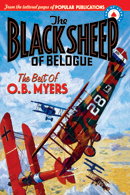 O.B. Myer’s didn’t really have any series characters. The few recurring characters he did have in the pages of Dare-Devil Aces, we’ve collected into a book we like to call “The Black Sheep of Belogue: The Best of O.B. Myers” which collects the two Dynamite Pike and his band of outlaw Aces stories and the handful of Clipper Stark vs the Mongol Ace tales. If you enjoyed this story, you’ll love these stories!
O.B. Myer’s didn’t really have any series characters. The few recurring characters he did have in the pages of Dare-Devil Aces, we’ve collected into a book we like to call “The Black Sheep of Belogue: The Best of O.B. Myers” which collects the two Dynamite Pike and his band of outlaw Aces stories and the handful of Clipper Stark vs the Mongol Ace tales. If you enjoyed this story, you’ll love these stories!
SIX down, and  six to go! For the seventh story from the Christmas 1931 issues of the Air pulps we have a story from the pen of a prolific pulp author and venerated newspaper man—Frederick C. Painton. Paint known to our readers for his gritty Squadron of the Dead.
six to go! For the seventh story from the Christmas 1931 issues of the Air pulps we have a story from the pen of a prolific pulp author and venerated newspaper man—Frederick C. Painton. Paint known to our readers for his gritty Squadron of the Dead.
The War Department sends Jerry Gallens to the 92nd Pursuit Squadron with a film crew in tow to make a movie! Gallens is the American flapper’s big crush, the swoon of old maids, the envy of every young American man, the sweetheart of the United States. He is America’s outstanding musical-comedy star, a Broadway matinee idol. He is a great movie actor, the only one outside of Charley Chaplin who’s had his pictures translated into the Chinese. But he also longs to be a real Ace like he’s portraying on screen! From the December 1931 issue of War Birds—it’s Frederick C. Painton’s “Death’s Double!”
Into the hard skies of war-aged pilots came a movie idol under special orders. They hated his guts and called him yellow, until that red day when hell broke loose over their heads—and a man was born.
Painton has once again named the squadron adjunct something along the lines of Willie-the-Ink. This time it’s Johnny-the-Ink, but it’s the same character. And not too dissimilar from Dugger Banks, the squadron leader in Painton’s “Aces Fly High” (Sky Fighters, November 1933), he’s named the squadron leader of the 92nd Pursuit “Digger” Banks!
TODAY we have a short but 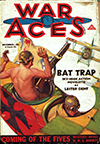 poignant story from the prolific pen of Robert Sidney Bowen. Bowen was a war pilot of the Royal Air Force, as well as the editor of one of the foremost technical journals of aviation in addition to penning hundreds of action-packed stories for the pulps.
poignant story from the prolific pen of Robert Sidney Bowen. Bowen was a war pilot of the Royal Air Force, as well as the editor of one of the foremost technical journals of aviation in addition to penning hundreds of action-packed stories for the pulps.
“Chunky” Towers was not a particularly good Jerry hunter. As a matter of fact he was just an ordinary product of Field No. 8 at Issoudun, with perhaps a better than the average portion of guts. He was always on the lookout for a possible scrap—especially with a certain German pilot who always flew a pale green Fokker—”Green Bird” as Chunky had nicknamed him. The real name of the pilot he did not know, and he didn’t care. Green Bird was not some great German ace who sent Allied pilots down like so many clay pigeons before his yammering guns. To tell the truth, Green Bird was a very ordinary pilot, and a rotten shot—just as rotten a shot as was Chunky.
They had met several times and on each occasion both spewed costly ammunition at thin air. By some queer trick of fate neither could get in the fatal burst when opportunity offered, and opportunity had not been stingy by any manner of means. It just seemed as though each was immune to the other’s bullets. Until that fateful morning…
Even after the Grim Reaper took over the controls, that Fokker obeyed its pilot—and showed a Yank how the dead repay chivalry.
OUR fifth tale from the  Christmas 1931 issues of the Air pulps is a short story by renowned pulp author Frederick C. Davis. Davis is probably best remembered for his work on Operator 5 where he penned the first 20 stories, as well as the Moon Man series for Ten Detective Aces and several other continuing series for various Popular Publications. He also wrote a number of aviation stories that appeared in Aces, Air Stories and Wings.
Christmas 1931 issues of the Air pulps is a short story by renowned pulp author Frederick C. Davis. Davis is probably best remembered for his work on Operator 5 where he penned the first 20 stories, as well as the Moon Man series for Ten Detective Aces and several other continuing series for various Popular Publications. He also wrote a number of aviation stories that appeared in Aces, Air Stories and Wings.
Lieutenant William Ballentine—a big name for such a small pilot. He looked like a ten-year-old dressed up in his big brother’s flying togs, he was so small. As a matter of fact, he was just a half-portion of pilot. But what he lacked in size he seemed to make up in joie de vivre. But when the C.O. told him to follow orders and “Ask No Questions”—unfortunately, he did just that.
Too much courage was Half-Pint’s burden—then came the day when he softened the C.O.’s anger and showed that even feathers have wartime uses.
TODAY we have 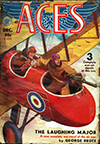 a story from the highly prolific George Bruce. Bruce, a former pilot, began writing in the 1920’s and became noted for his aerial war stories—several publications even bore his name. In the 1930’s and ’40’s he transitioned into screenwriting for Hollywood action films and then into tv in the 1950’s and ’60’s.
a story from the highly prolific George Bruce. Bruce, a former pilot, began writing in the 1920’s and became noted for his aerial war stories—several publications even bore his name. In the 1930’s and ’40’s he transitioned into screenwriting for Hollywood action films and then into tv in the 1950’s and ’60’s.
The Fourth Squadron hated Major Powers. That hatred seeped out of the soul of the lowliest of the ground crew exactly as it surged unceasingly in the souls of the pilots.
He never seemed burdened by fatigue. His eyes never lost the half-feverish, half-mocking light—never lost a peculiar brilliancy which seemed to feed upon his soul. His face was never anything but a pale mask, contorted by a never-changing grin which drew his thin lips back over his white teeth—and made every man on the field harbor the insane desire to smash his fist against Powers’ face and drive those wolf-like teeth down the Major’s throat. Yes, The Fourth hated Major Powers—that is, until they got to know him.
The pilots of the Fourth fought black-crossed ships, but they kept their hate for the man who led the way into the sky. They hated his sneer, his jeers, his scorn—but most of all they hated his laugh.
From the December 1931 issue of Aces, it’s “The Laughing Major” by George Bruce!
TODAY, for our  twelve stories of Christmas 1931, we have an excellent tale by Edgar A. Manley from the pages of the December 1931 Sky Birds magazine!
twelve stories of Christmas 1931, we have an excellent tale by Edgar A. Manley from the pages of the December 1931 Sky Birds magazine!
Destiny had linked Chuck Bland strangely with that mysterious pair on the train from Paris. One a French artillery officer, the other a French flyer—one a murderer, the other a murdered man. And Chuck Bland did not know which was which—until one night, weeks later, in the messroom of a French drome!
From the pages of Sky Birds, it’s “The Devil on Wings” by Edgar A. Manley!
You may recognize the art for this story—it was also used for the Philip Strange story “Hell’s Gateway” (Flying Aces, April 1932)
THIS week we present a cover by Colcord Heurlin! Heurlin worked in the pulps primarily over a ten year period from 1923 to 1933. His work appeared on Adventure, Aces, Complete Stories, Everybody’s Combined with Romance, North-West Stories, The Popular, Short Stories, Flying Aces, Sea Stories, Top-Notch, War Stories, Western Story, and here, the cover of the December 1931 Sky Birds!
Torpedoes for Trouble
 IT WAS a far cry from the early days of the war, when aviators were asked to drop bombs on hurriedly constructed Zeppelin hangars in northern Belgium, to the 1918 bomber with its aerial torpedo. In the early days airmen often made their own bombs of petrol cans wrapped with tarred rope which was designed to blast out hangars and then set fire to the remains. From those days bombing went through the 20-pounder stage, automatic racks, and eventually blossomed out with ships carrying single 550-pound missiles designed to fang their way through many feet of solid concrete before exploding. These were known as delayed detonation bombs.
IT WAS a far cry from the early days of the war, when aviators were asked to drop bombs on hurriedly constructed Zeppelin hangars in northern Belgium, to the 1918 bomber with its aerial torpedo. In the early days airmen often made their own bombs of petrol cans wrapped with tarred rope which was designed to blast out hangars and then set fire to the remains. From those days bombing went through the 20-pounder stage, automatic racks, and eventually blossomed out with ships carrying single 550-pound missiles designed to fang their way through many feet of solid concrete before exploding. These were known as delayed detonation bombs.
On this month’s cover we show a two-seater bomber of this type. It has just released a 550-pound torpedo over a German airdrome. As in this picture, the pilot usually dived his ship on the target as though he were going to fire his fixed guns, and then released the torpedo-bomb. The spinning projectile did the rest.

“Torpedoes for Trouble”
Sky Birds, December 1931 by Colcord Heurlin
TODAY we have  a story from the pen of a prolific pulp author James Perley Hughes! Hughes was a frequent contributor to various genres of pulps, but he seemed to gravitate toward the air-war spy type stories.
a story from the pen of a prolific pulp author James Perley Hughes! Hughes was a frequent contributor to various genres of pulps, but he seemed to gravitate toward the air-war spy type stories.
Skag, Dinty and Mugs Miller liked to “groom” the fresh recruits to the Game-Cock Squadron. They were case-hardened comedians and had given Major Crossley all kinds of trouble by their weird ideas of what made a joke. The quiet, bashful fledgling was usually let off with a short hazing, but the fresh fish were tormented until the three were satiated. Orders against this hazing had been issued time and again, but they were difficult to enforce. It was time someone taught them a lesson, and who better than someone straight from the school at Issoudun!
If you didn’t like somebody in the Game-Cock Squadron, you just arranged for him to fight a duel with von Steuben, famous German ace. It sounded easy—until those three tough boys from South Boston tried it on a certain replacement!
TO START off our 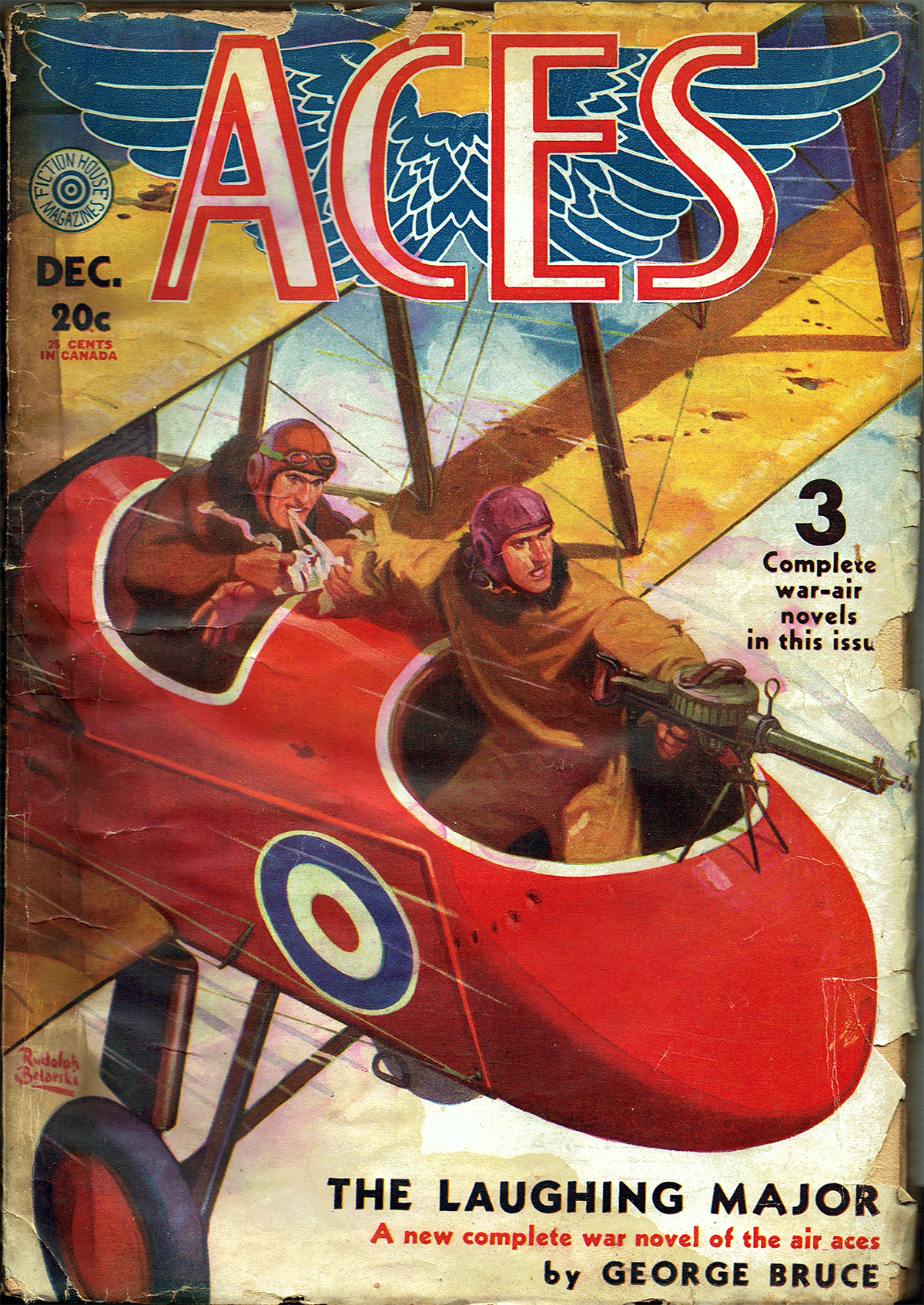 twelve stories of Christmas 1931, we have an excellent tale by E.W. Chess from the pages of the December 1931 Aces magazine!
twelve stories of Christmas 1931, we have an excellent tale by E.W. Chess from the pages of the December 1931 Aces magazine!
Martin Hale became a man without a country. He had been found guilty of desertion and insubordination. Rather than leave the war, Hale assumes the identity of an American pilot who has been presumed dead after his plane crashes and burns. But just who is Jerrald Hammond? What starts out as a way to stay in the war turns into a tale of espionage and intrigue.
One pilot passed to the tune of tapping drums, another fell with crimson flame to mark his end. But behind the Front was a strange rendezvous for the ghosts that walked the war night.
From the pages of Aces, it’s “Dual Control” by E.W. Chess!
Pulpflakes posted an excellent post about the life of “Elliot Chess—Fighter pilot, Author” last year. You can check it out here!